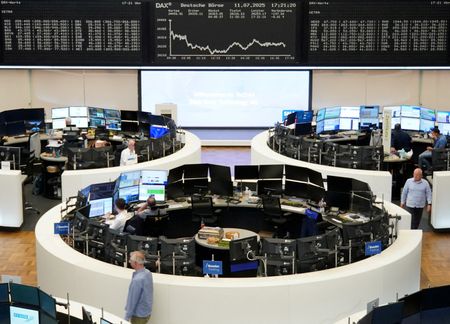By Andreas Rinke
BERLIN (Reuters) -Germany wants to ramp up its use of artificial intelligence by the end of the decade to support Europe’s largest economy and compete on the world stage in key technologies, a document seen by Reuters showed on Tuesday.
The race to develop AI is intensifying, with China, the United States and India emerging as frontrunners, putting pressure on Germany and the European Union more broadly to catch up.
“With an AI offensive, we want to generate 10% of our economic output based on AI by 2030 and make AI an important tool in central fields of research,” the German research ministry’s draft strategy said.
The strategy does not say what proportion of the German economy is currently supported by AI.
According to an OECD report from 2024 on Germany and AI, the country should leverage AI to meet its most pressing challenges, including the green transition, administrative and industrial efficiency and healthcare quality.
Economists have pushed for a rapid roll-out to keep German industry competitive, with the IW institute reporting earlier this year that the country could increase productivity by an average 0.9% annually from the years 2025 until 2030, rising to 1.2% over the course of the 2030s.
So far this decade, that figure has stood at 0.4%.
The German cabinet is expected to pass the strategy before the end of the month, setting ambitious targets to catch up with the United States and China on AI.
The document sets out targets for bids to construct high-capacity processing centres in the European Union to be in operation by 2027. The government wants to coordinate its applications with industry, experts and federal states by the end of the year.
The European Commission has allocated 20 billion euros ($23 billion) in EU funding for the construction of AI ‘gigafactories’.
Under a coalition agreement finalised earlier this year, the German government aims to have at least one of the centres built in Germany, with Deutsche Telekom among the companies interested.
The German strategy also sets out goals to ramp up quantum computing technology, with two “error-corrected quantum computers” to be created by 2030 and made available to users, the document said.
It also sets out a plan to put Germany’s first research satellite for quantum communication into operation this year.
The strategy says that while Germany has seen early success in innovation, it is falling behind in the commercialisation of AI.
“This creates competitive disadvantages and dependencies,” the document said, adding that AI research in Germany must be linked to fields such as robotics, mechanical engineering, car manufacturing and the chemicals industry.”
(Reporting by Andreas Rinke, Writing by Rachel More, Editing by Friederike Heine, Alexandra Hudson)











